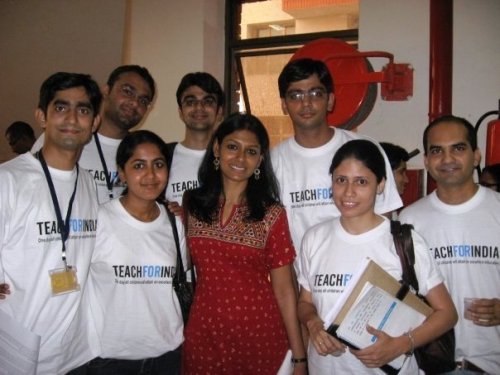The Teach For India initiative is the catalyst for a new movement to bridge the education gap in India, with its volunteers serving as the spark to inspire children to become successful.
—US Secretary of State,Hillary Clinton
Any program working towards improving performance levels of students, particularly from disadvantaged and challenging backgrounds, needs to be encouraged, especially in a country like India. Teach For India aims to do just this…the concept is exemplary.While I am sure the learning levels of students will improve, teaching students from underprivileged backgrounds can be a life altering experience. What can be more motivating than knowing you are playing a key role in transforming their entire future.
– Anand Mahindra, MD, Mahindra & Mahindra Limited
Teach For India will be driven by young people who through their contribution to inclusive growth will also develop a sense of social responsibility and sensitivity when they become the leaders of tomorrow. Besides improving the quality of education it would most importantly also enhance their own leadership and communications skills.
– Dr Nachiket Mor, President, ICICI Foundation for Inclusive Growth
Teach For India has the potential to transform the process of K 12 learning in our country and create a whole generation of motivated youth.
– Ganesh Natarajan, Chairman Nasscom / Global CEO, Zensar
I strongly endorse the Teach For India campaign. I am confident that the young people who participate in this program will themselves benefit immensely from this noble activity.
– Ajit Rangnekar, Dean Indian School of Business
Teachers are real heroes.
—Amir Khan, Brand Ambassador Teach For India & Bollywood Superstar.
At Thermax, we want our Trainees to have sensitivity towards all stakeholders and concern for the society in which we live. I am confident Teach For India will develop all these qualities and I fully endorse it.
– Anu Aga, Former Executive Chairperson, Thermax Group
The bright young minds that join this movement are going to harness their learnings and experiences and combine to form a collective force of leaders who will make the difference.
– Rajat Gupta, Senior Partner Emeritus, Mckinsey and Company
The Indian adaptation of the proven TFA model of selecting the best graduates from leading Indian colleges, and training and mentoring them as they spend 2 years in government and poor private schools – where they impart fresh ideas within schools, help children measurably improve their learning levels and themselves become capable leaders – appeals to us.
– Barun Mohanty, Michael and Susan Dell Foundation
When an individual can look around and see a connection between a man that has too much bread and the man that has too little, then it becomes his/her obligation to take action. Teaching was my way of taking action.
– Mariyam Farooq, Teach For America Alumni
In the US, Teach For America alumni serve as school system superintendents, school principals, acclaimed teachers, policy advisers and social entrepreneurs. Teach For India has the potential to have a possibly greater impact in providing all of your country’s children with the opportunities they deserve.
– Wendy Kopp, CEO and Founder, Teach For America

